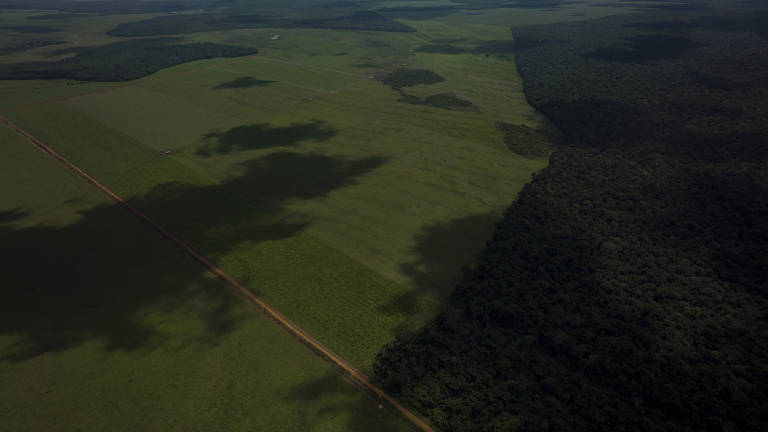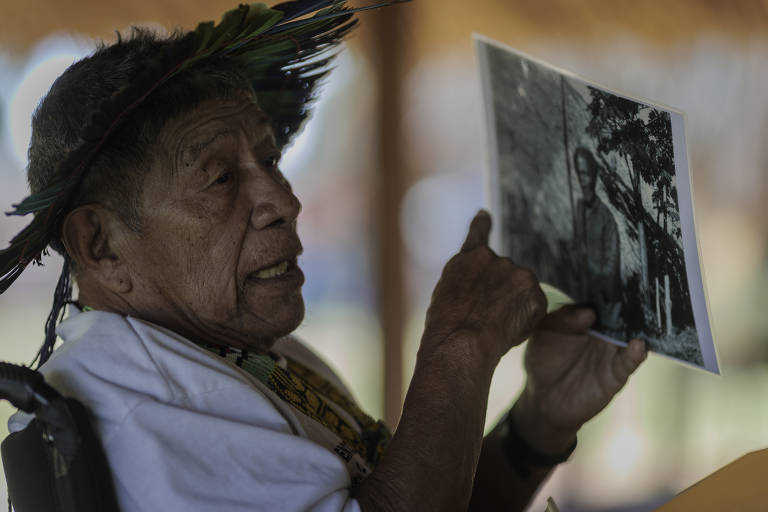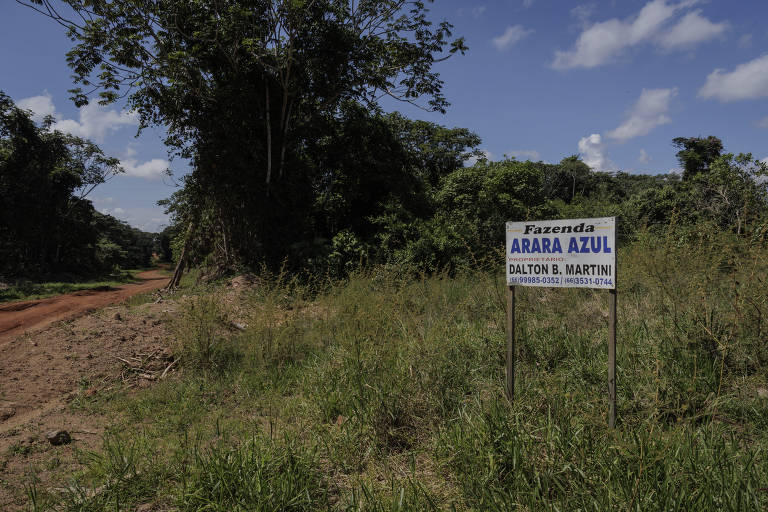The time frame thesis, which sets limits for the demarcation of traditional territories, may benefit a group of large-scale farmers occupying parts of the Batelão Indigenous Land, in northern Mato Grosso, many of whom have been fined for environmental infringements in the area.
The territory is the birthplace of the Kawaiwete Indigenous people — also known as Kayabis. Trespassers include Miguel Vaz Ribeiro, current mayor of Lucas do Rio Verde (MT), and his predecessor in office, Marino José Franz.
Both are members of a political party named Cidadania [Citizens Party]. Lucas do Rio Verde is located 285 km from Tabaporã, the closest town to the Indigenous land.
When mayor Ribeiro was elected in 2020, his declared assets stood at R$131 million, including the São Jorge Farm, located in Batelão. His claimed ownership is based on a lawsuit trying to annul any designation of the area as an Indigenous territory.
As a candidate, Ribeiro told the Electoral Courts that two plots of land in the area were worth R$52,500. Former mayor Marino Franz is one of the owners of Fiagril, a grain producing business with a capital of R$626.8 million, according to company records at the Federal Revenue Service. Both the current and former mayors were fined by IBAMA (Brazilian Institute for the Environment and Renewable Natural Resources) for environmental crimes.
The dispute over the Batelão Land also involves another four large-scale farmers who were identified as perpetrators of environmental offences or crimes.
Their defence attorneys were asked to comment on the case, but have not replied.
In all, the court cases against the Kayabis involve 25 groups of individuals and companies, who occupy 117,000 hectares of the Indigenous land. They allege that they bought their farms only after the Indigenous groups had been evicted from the place.
On 3 June, Folha revealed that the deputy mayor of Sinop, Dalton Benoni Martini (PTB), has owned land in the Batelão area for over 30 years. Since the early 1990s, he has raised cattle, grown soy and corn, and extracted timber from the Amazon rainforest. He has filed a prescriptive easement suit (also known as usucaption) to obtain legal rights over the land.
Martini is among the 25 parties who are trying to secure ownership of the land in court. We have gained access to some background documents on the cases, which enabled us to identify the farmers and companies that are exploring Batelão, the birthplace of the Kayabis.
All of them stand to benefit from the time frame thesis if it is found to be valid. The thesis suggests that Indigenous peoples should only have the right to a traditional territory if it was in their possession when the Constitution was enacted, in October 88.
However, it ignores routine evictions and conflict situations that led Indigenous communities to move to other areas — as is the case with the Kayabis.
In the 1940s, the government of Mato Grosso illegally started selling pieces of land to anyone interested in exploiting the area. In the 1960s, after a series of invasions and conflicts (mainly with rubber tappers), a group of Kayabis were taken to the Xingu Indigenous Territory by the Villas-Bôas brothers, two well-known Indigenous rights activists.
However, this was done without the Kayabis’ agreement or acceptance. Some resisted and remained in other areas near Batelão, where they used to hunt, fish, and gather material for making bows, arrows, and sieves.
Many moved back from the Xingu to these areas later on. In the following decades, several farmers began to occupy and deforest the Batelão Land. The Kayabis now want to have their land back, as we have learned from Indigenous people living in nearby villages.
The farmers, who claim to have bought the areas, would have better chances of guaranteeing the legal ownership of the land if the time frame thesis were to be approved.
On 30 May, the Chamber of Deputies approved a bill of law validating the time frame, one of the priorities of the "ruralist" caucus in Congress. The text still needs to be reviewed and voted by the Senate. At the same time, the STF (Federal Supreme Court) is discussing the constitutionality of the thesis.
Justice Edson Fachin, rapporteur of the case at the STF, and justice Alexandre de Moraes have already voted against the time frame. Moraes presented his vote during a plenary session on 7 June, shortly before justice André Mendonça asked for more time to review the case, thus suspending the trial.
Justice Kássio Nunes Marques voted in favour of the thesis. The Kayabis are no longer present at the Batelão Indigenous Land. Farmers have taken over the place, with their vast soy and corn plantations and their cattle ranches.
In September 2016, federal judge Cesar Augusto Bearsi, from the 3rd Federal Court in Cuiabá, issued a decision declaring the Batelão Land as an area traditionally occupied by the Kayabis. According to his sentence, the deeds held by the farmers occupying the area must be declared null and void.
The decision also established that the State should compensate those farmers for any improvements made on the land, based on the idea that they were made in good faith for the development of their rural properties.
These compensation payments might amount to R$123.3 million (in 2016 values). The farmers have appealed the decision in higher courts.
The improvements on the lands occupied by the current and former mayors of Lucas do Rio Verde are worth R$12.3 million, as stated in the 2016 sentence. In 2019, IBAMA fined mayor Miguel Ribeiro for building a dike and a concrete pipeline without an environmental licence. The structure overlaps with parts of the Chapada dos Guimarães National Park.
In 2015, Marino Franz was fined by IBAMA for exploiting the forest without permission. Edson Melozzi, who also runs a farm in the Batelão area, was fined by IBAMA for the illegal use of fire in 2009. In 2013, Elpídio Daroit was fined over R$3 million for illegal deforestation in the Amazon region of Nova Ubiratã (MT), the same year in which an area of 636 hectares was seized by IBAMA for the same reason.
Another occupant of the Batelão is a timber company named Sinopema Indústria e Comércio de Madeiras. In 2019, they had to sign a TAC (conduct adjustment agreement) with the Mato Grosso State Prosecutor's Office due to irregularities in their CAR record (Rural Environmental Registry).
According to the prosecutors, Sinopema had been summoned to present documentation authorising the existing overlap between their farm and the Batelão Indigenous Land, or else to remove the overlapping area from their claimed property.
Translated by Luiz Hargreaves
The Entranced Planet (Planeta em Transe) project is supported by the Open Society Foundations


